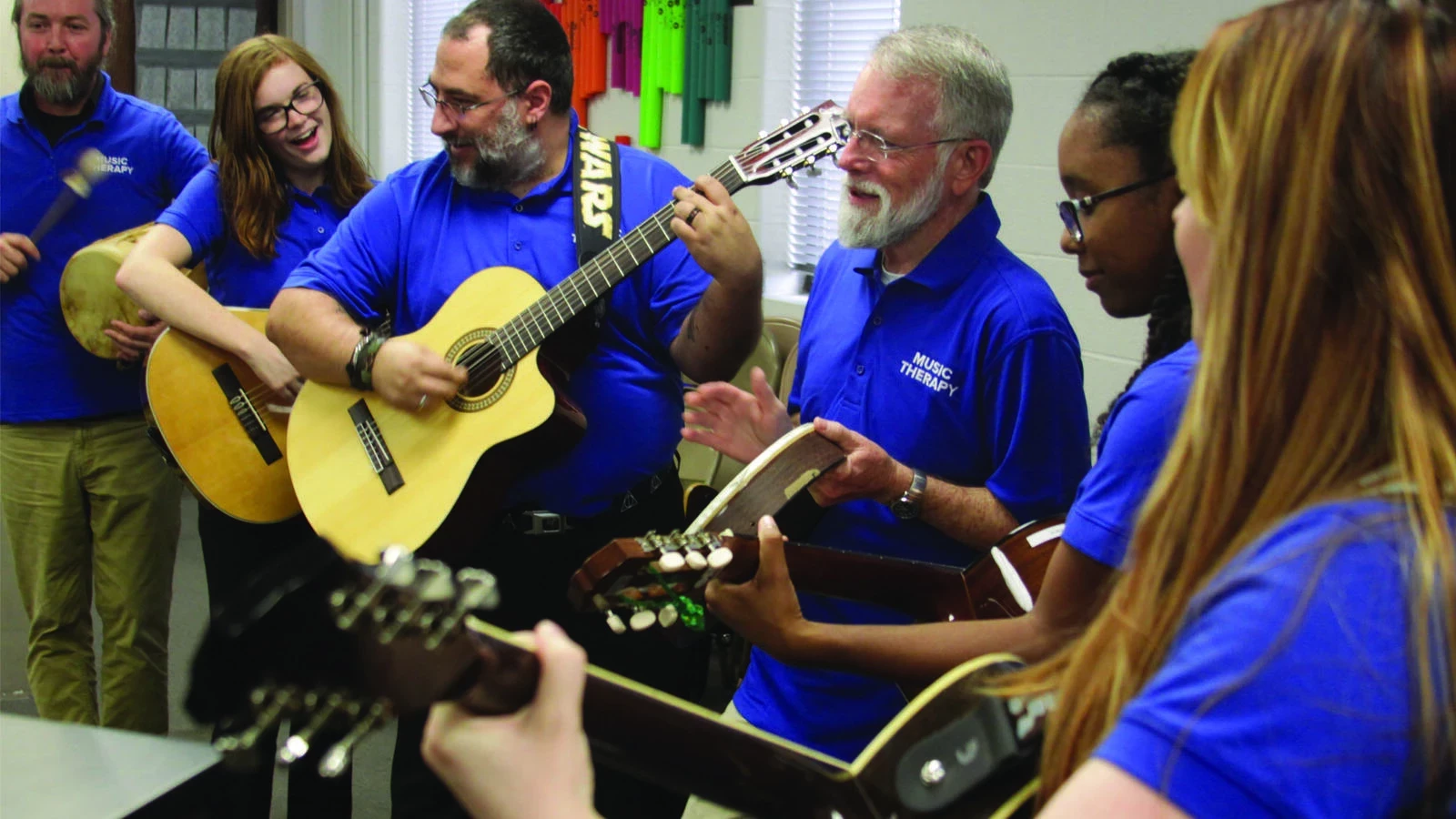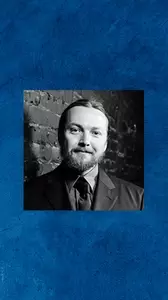
Music Therapy class
A career in music therapy begins with a strong foundation in music coursework. Current UK undergraduate students who are interested in pursuing a career in music therapy should discuss this interest as soon as possible with their academic advisor and/or UK Music Therapy faculty. Students who have an undergraduate degree in music therapy may pursue the 30-credit hour Master of Music in Music Therapy degree, which includes a thesis or clinical project. A combined equivalency/master degree program is available for students without an undergraduate degree in music therapy. Advanced clinical training opportunities are available at UK HealthCare and in the Lexington community.
This program is approved by the American Music Therapy Association.
A board-certified music therapist (MT-BC) works within a therapeutic relationship with clients using music-based techniques to address individualized goals. All manner of music engagement may serve as the foundation for music-based experiences in music therapy (e.g., singing, playing instruments, talking about music, moving to music, creating music, music listening, etc.). Music therapists adapt to the people they work with. Depending on the goal, music therapists typically use music that is preferred by the people they work with (music is not “good” or “bad”), and often music that is familiar to them (but not always!).
Music therapy may be used to:
- Promote wellness
- Manage stress
- Alleviate pain
- Improve social skills
- Express feelings
- Support memory and cognition
- Improve communication
- Improve coping skills
- Promote physical rehabilitation
- …and many other goals
For more information about music therapy, please visit the American Music Therapy Association website.
You can find tuition refund policies, deadlines, amounts, and other important information on the Student Accounts site.
Applications for Fall admissions are due March 15, which is earlier than the Graduate School deadline! If you plan to apply for a graduate fellowship, you must complete your application a few months earlier than that. Please review information about graduate fellowships on the UK Graduate School website.
The information here is presented for your convenience. Be sure to always check the official UK Catalog for course requirements and degree information.
Contact Dr. Alaine Reschke-Hernandez for more information.
- Admission to the Program
The application to the music therapy equivalency and MM includes the following components:
- Applicants must meet the Graduate School admission requirements. In rare cases, an appeal is possible.
- Complete the online application through the UK Graduate School website. (Select MM-Music Therapy as the degree for which you are applying.)
- Official undergraduate transcripts
- 2-page resume, which should include:
- Name, address, e-mail, and phone number
- Education (institutions, degrees, dates, majors, current GPA, and any honors)
- Work Experiences (locations, dates, teaching, and other professional experiences)
- Presentations, publications, and awards
- Any other sections you deem relevant
- Personal statement: Please submit a 1-page statement (at least 150 words, 3-5 paragraphs) expressing your motivation for seeking this degree from the University of Kentucky and how this degree fits into your goals for the future.
- Writing sample of your scholarly writing abilities. It can be a paper you wrote for an undergraduate course and does not need to relate directly to music therapy.
- Three letters of recommendation: When you submit your online application via the graduate school website, you will be asked for the e-mail addresses of the people who have agreed to write letters of recommendation. The graduate school will e-mail them directly to request their letters. Please let your letter writers know, as sometimes this email goes to “junk.” Without exception, we cannot decide on your application, or any scholarships or fellowships, until we receive all 3 letters.
- International students only: TOEFL or Duolingo scores (refer to UK Graduate School website).
- Audition and interview with the music therapy faculty. Please complete an audition request form. We will ask you to
- Sing while accompanying yourself on guitar.
- Sing while accompanying yourself on keyboard.
- Sing a simple song a cappella.
- Respond to questions about music therapy, your interest in our program and preparation for graduate school, and the American Music Therapy Association’s Code of Ethics. Please refer to specific information about the music therapy-specific audition and interview on the School of Music Admissions page.
- Music therapy area entrance exams covering music theory, aural skills, and music therapy: Please review specific information about the music therapy-specific exams carefully on the School of Music Admissions page.
Please complete an audition request form. We will confirm the exact date and time for your audition, interview, and entrance exams approximately 2 weeks prior to the scheduled date. Email Dr. Yinger and/or Dr. Reschke-Hernandez with questions.
For clinical training opportunities, UK Music Therapy students must complete onboarding through the University of Kentucky HealthCare office of Observation and Learning Experience (OLE). Pleas review the requirements of the OLE on UK HealthCare's site listed under “Students” tab. Be aware that the OLE process takes up to a month and includes fees. UK Music Therapy students must also complete the Fayette County Public Schools volunteer form, which is free, includes a background check, and can take up to a month. When completing the form, select all schools and when prompted type “I will be completing a music therapy practicum in FCPS but I do not know which schools yet” in the text box.
The University of Kentucky works to provide courses and programs to students across the state of Kentucky, the country and abroad. Online courses, field placements, student teaching, research and other similar educational activities may be offered as part of a distance learning or face-to-face program, and may be completed outside of Kentucky. Learn more about Out-of-State Educational Activity.
- Master of Music in Music Therapy
The information here is presented for your convenience. Be sure to always check the official UK Catalog for course requirements and degree information.
An undergraduate degree in music therapy (or the equivalent) is required for full admission to the 30-credit hour Master of Music in Music Therapy degree. Students must also complete a thesis or clinical project and hold the MT-BC credential to fulfill requirements of the MM in Music Therapy. Students work with their music therapy faculty advisor to design an individualized program of studies. Students can select electives that best fit their desired area of specialized practice. The following outlines the requirements for the MM in music therapy.
Major Course Requirements (12 Credits)
- MUS 600: Research I (3 credits)
- MUS 633: Graduate Clinical Placement in Music Therapy (3 credits)
- MUS 768: Residence Credit for the Master’s Degree (6 credits)
Guided Electives in Music Therapy (9 Credits):
The student will choose 3 courses from the following for a total of 9 credits. MUS 732 may be taken twice if it pertains to a different topic.
- MUS 630: Medical Music Therapy (3 credits)
- MUS 664: Inclusive Music Principles and Practices (3 credits; asynchronous)
- MUS 732: Seminar: Topics in Music Therapy (3 credits)
- MUS 770: Psychology of Music (3 credits; asynchronous)
- New courses may be added.
Free Electives (9 Credits):
- The student will select 9 credits from related graduate coursework (e.g., psychology, counseling, human development, diversity and inclusion, etc.) in consultation with their faculty advisor.
- Combined Equivalency/Masters Degree
Earning board-certification in music therapy (denoted by the credential MT-BC) is required to practice as a music therapist. It is also required prior to completing master’s coursework in music therapy at UK. To become board-certified, students must have completed appropriate coursework in music foundations, clinical foundations, and music therapy, either during undergraduate studies or as part of a post-baccalaureate music therapy equivalency program. There are certain courses that you can take during your undergraduate training or prior to entering the equivalency program. We encourage you to talk with Dr. Reschke-Hernandez and/or Dr. Yinger to learn what courses you should take to prepare for an equivalency in music therapy.
A student who is not a board-certified music therapist but who studied music during their undergraduate training (either as a music major or, in some cases, as a music minor) may apply to the combined equivalency/master's degree program at UK. This program enables a student to complete all entry-level music therapy coursework, clinical practicum training, and clinical internship, which are required to take the board-certification exam administered by the Certification Board for Music Therapists (to learn more about the MT-BC credential, please visit the Certification Board for Music Therapists website). Then, students may complete the master’s in music therapy degree requirements.
Areas in which students must demonstrate competency in order to become eligible for board-certification and subsequent completion of master’s level coursework include: music foundations, clinical foundations, and music therapy. Music foundations and clinical foundations requirements may be completed at UK or during undergraduate coursework. Students in the equivalency program at UK must take all music therapy core courses at UK. Please note that currently equivalency students at UK are billed at the graduate tuition rate.
MUSIC FOUNDATIONS (54 CREDITS)
- Music theory (aural and written)
- Music history
- Conducting
- Improvisation, movement, and percussion courses (Example: Orff Schulwerk)
- Arranging
- Applied lessons on primary instrument
- Ensemble participation
- Proficiency in guitar, piano and voice
CLINICAL FOUNDATIONS (18 CREDITS)
- Intro to psychology
- Abnormal psychology
- Developmental psychology
- Anatomy and physiology
- Other behavioral science courses
MUSIC THERAPY (18 CREDITS)
* Equivalency students must complete all music therapy core courses at UK, which includes a minimum of 1,200 hours of pre-internship and internship clinical training.
- Music therapy principles and foundations
- Music therapy applications
- Psychology of music
- Music learning and behavior
- Music therapy clinical internship: The bulk of clinical training occurs during internship, which is 6-months, full time, and typically January-June or February-July. It is often unpaid but depends on the internship site – some internships offer a small stipend, and some are starting to pay interns an hourly rate. The internship is not guaranteed to be in Lexington.
A music therapy faculty advisor will work with each student in the combined equivalency/master's degree program to create an individualized program of studies based on the entry-level coursework that the student needs to take. Courses taken to satisfy equivalency requirements do not count toward the 30-credit hour Master of Music in Music Therapy degree. Students who are interested in UK’s music therapy program may request a transcript review from Dr. Reschke-Hernandez and/or Dr. Yinger to determine how much equivalency coursework is needed.
- Clinical Training Opportunities
Music therapy students at UK have opportunities to conduct pre-internship and advanced clinical work with board-certified music therapists in a variety of settings in the Lexington community and surrounding counties. Our list keeps growing and includes:
- UK HealthCare
- Public schools
- Early childhood centers
- Behavioral health centers
- Long-term care facilities
- Community-based organizations for children and families
- Build Inclusion
- UK Human Development Institute
- Senior centers
- Area private practices, including:



